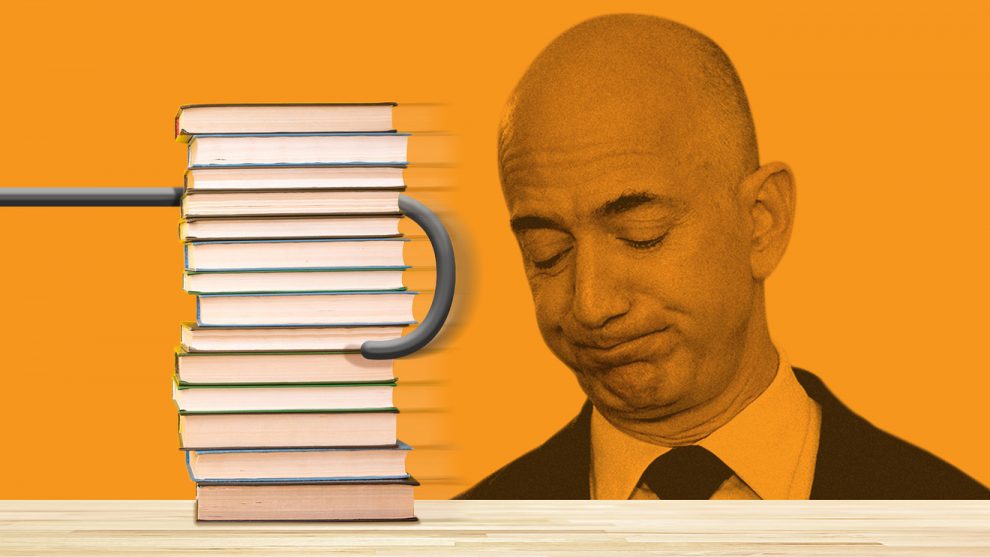
Facebook FB, -3.03% has introduced a range of measures — some controversial — to stem the flow of false information. Will Amazon follow suit?
Jeff Bezos’s e-commerce giant pulled “Healing the Symptoms Known as Autism” and “Fight Autism and Win” from its platform in March, according to NBC News — two “autism cure” books that falsely promoted dangerous treatments like drinking and bathing in chlorine dioxide, a bleach-like substance. The company later removed several more books that made unscientific claims about so-called bleach cures.
‘I don’t think it’s enough to scurry away and say, “Hey, we’re just selling books and products, and we leave it up to consumers to be aware.” ’
Autism spectrum disorder, which affects about one in 59 U.S. children, has no known cure. Research has also discredited claims linking vaccines with autism risk.
“Amazon and [the] social-media giants have to understand the negative influence that their platforms have in spreading misinformation, disinformation [and] deadly information, whether it’s vaccines or bleach cures,” Arthur Caplan, a professor of bioethics at the New York University School of Medicine, told MarketWatch.
He deemed Amazon a “quasi–social media site” for its review platform, and called on Amazon and other big tech companies to “step in and police this stuff better.”
The books’ removal from Amazon AMZ, -1.43% marked the latest move by a tech company to address the spread of misinformation, particularly regarding autism: Pinterest PINS, -2.31% in February blocked vaccine-related search results in an effort to rein in anti-vaccine content, while YouTube GOOG, -1.28% barred ads from anti-vaccine videos.
The site’s content guidelines for books and ‘offensive and controversial materials’ page don’t specifically provide guidelines for false or misleading information.
Amazon reportedly yanked anti-vaccine films from its Prime steaming service in March, and Twitter TWTR, -1.88% this month debuted a search feature directing users to a government-operated vaccine information site.
An Amazon spokeswoman confirmed to MarketWatch this week that “several titles are no longer available” but did not answer questions about the company’s rules for curbing misinformation or how it perceived its own role in tamping down on it.
The site’s content guidelines for books and “offensive and controversial materials” page don’t provide specific guidance on false or misleading information.
“This isn’t a free-speech issue,” Caplan said. “When you put up clearly dangerous products, it’s something that Amazon, Facebook, Instagram [or] whoever should be watching.” He said he sees it instead as a “a public-health, protect-vulnerable-people-against-harm issue.”
What steps should Amazon take to prevent fake news?
Caplan advised creating a “medical advisory board” of sorts to review books and other publications for “outright dangerous” content. The company should pull a product from the marketplace “if it’s clear, according to medical expertise, that it is going to harm and kill,” Caplan said.
(An Amazon spokesperson did not immediately return a request for comment.)
The line between censorship and social responsibility “errs toward free speech,” he said, “but it doesn’t go toward ‘anything goes.’ ” Companies should seek to debunk conspiracy theories where possible, he added. He cited “chemtrails” — the conspiracy theory that government overlords spray harmful chemicals from planes — as an example.
‘If someone says, “Use bleach on your autistic child,” and it has 150 five-star reviews, that counts as more than just the marketplace.’
Amazon should also keep a close eye on product ratings, Caplan suggested, particularly if people are using them for political purposes. “I don’t think it’s enough to scurry away and say, ‘Hey, we’re just selling books and products, and we leave it up to consumers to be aware,’ ” he said.
“If someone says, ‘Use bleach on your autistic child,’ and it has 150 five-star reviews, that counts as more than just the marketplace.”
Does Amazon have a role to play in public health?
Amazon’s learning about and removing individual books that promote false and dangerous messages is one thing, but expecting the company to be a general arbiter of accuracy is quite another, said Chris MacDonald, an associate professor of ethics at Ryerson University in Toronto.
“While there’s clearly an obligation for companies to respond in cases where there’s a specific risk to public health or the health of individuals, it’s much harder to claim that they have a general obligation to ensure the truth of every word in every book they sell,” MacDonald told MarketWatch.
‘I get it’s maddening, as someone who teaches critical thinking in addition to ethics, to see them selling outright rubbish.’
For starters, lots of science-related content is likely to fall on the borderline, MacDonald said. And there’s no guarantee Amazon would have the scientific capacity to evaluate such content in controversial areas, he said, nor that the company would use that wisdom to discern between “something that’s plainly false versus something that is a minority view scientifically, but still interesting and worthy of being published.”
“I get it’s maddening, as someone who teaches critical thinking in addition to ethics, to see them selling outright rubbish,” he said. “But I do worry about giving them the power to decide what shouldn’t be sold.”
Given Amazon’s outsized role in the book-selling and publishing businesses, he added, “it’s an awful lot of power to vest in the hands of corporate decision makers.”
Caplan, for his part, doesn’t see much distinction between Amazon’s obligation to protect the public versus that of a bricks-and-mortar book retailer.
“I think the traditional ones should’ve been doing the same thing: deciding what they’re going to put on the shelf, what they’re going to keep behind the counter and what they wouldn’t put in the store at all,” he said. “If they could manage pornography … in terms of what they made available or not, or said you could only get at the counter, I guess they could do it with lethal medical misinformation.”
Today’s hyperpoliticized climate has given way to new concerns that can shift the burden of responsibility, Caplan added. “There are a lot of emerging issues,” he said. “We’re not relying anymore on the National Academy of Sciences and Walter Cronkite to tell us what’s up.”











Add Comment